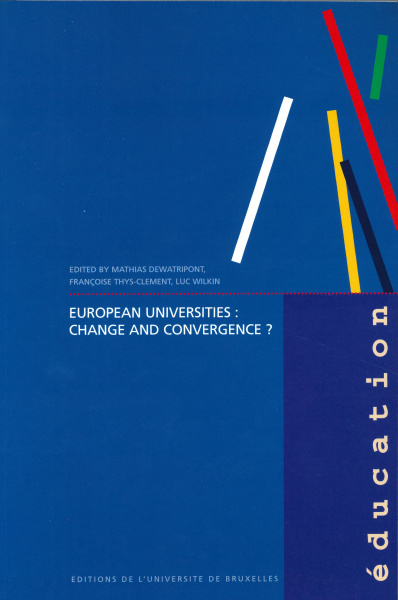European Universities: Change and Convergence?
Première édition
Universities play a central role in the production and dissemination of knowledge. Understanding and improving their functioning is therefore vital for extending the "knowledge frontier". Lire la suite
A multiuniversity project was set up in 1997 - with researchers from the Université libre de Bruxelles, the Katholieke Universiteit Leuven and the Université de Mons-Hainaut (funded by the Belgian Federal Government under its PAI/IAP Programme) - to study various facets university behavior. In 2002, the network has been extended to include researchers from the Facultés universitaires Saint-Louis, the Facultés universitaires catholiques de Mons, the Universiteit Antwerpen, and the Université des sciences sociales de Toulouse. It builds on network members' academic expertise in microeconomics, strategic management, and the economics of education, as well as on their practical academic management expertise. A previous book in this series, published in 2001, has provided a sample of research outputs from the project, with special emphasis on the strategic management of universities.
This second book addresses more specifically the challenges universities face in the emerging "European university market". It first presents the viewpoints of the European Commissioner for Research, Philippe Busquin, and from the academic authorities of the Université libre de Bruxelles, Robert Tollet and Pierre de Maret. It then includes several contributions from well-known international academics focusing on both the United States and various European countries. The challenges coming from increased mobility, demand for accountability and reduced public budgets, as well as their impact on students, researchers and teachers, are considered. The degree of convergence and of diversity across countries is stressed in terms of : (i) functioning of university systems, (ii) assessment of academic performances, (iii) response to student and societal needs, (iv) governance systems, and (v) teaching and research networking strategies. A contrasted picture is presented, with a variety of responses being experimented in reaction to the increased pressures higher mobility and reduced public budgets. A common theme is the attempt by universities to introduce elements of "managerialism"; in their governance while preserving their academic specificity. This requires the right combination of market incentives, public intervention and university autonomy. Achieving such an optimum is a difficult task.
The contributions included in the book point to various successes and difficulties universities have experienced in this process. They should be of interest to all citizens interested in the management of Europe's key resource : the creation and diffusion of knowledge. They are of course especially relevant for all the participants in the higher education sector, be they students, researchers, teachers or policymakers.
Spécifications
- Éditeur
- Éditions de l'Université de Bruxelles
- Édité par
- Mathias Dewatripont, Françoise Thys-Clément, Luc Wilkin,
- Contributions de
- Mathias Dewatripont, Françoise Thys-Clément, Luc Wilkin, Josep Bricall, Philippe Busquin, Henri Capron, Michele Cincera, Jean-Pierre Contzen, Harry de Boer, Pierre de Maret, Larry L. Leslie, Stéphanie Mignot-Gérard, Christine Musselin, Jørgen Gulddahl Rasmussen, Michael Reed, Sheila Slaughter, Arild Tjeldvoll, Michael Shattock, Robert Tollet, Stephen Yeo, Jean-Louis Vanherweghem,
- Langue
- anglais
- Catégorie (éditeur)
- > Business & Économie
- Catégorie (éditeur)
- > Psychologie & Éducation
- BISAC Subject Heading
- EDU015000 EDUCATION / Schools / Levels / Higher
- Code publique Onix
- 06 Professionnel et académique
- CLIL (Version 2013-2019 )
- 3080 SCIENCES HUMAINES ET SOCIALES, LETTRES
- Subject Scheme Identifier Code
- Classification thématique Thema: Enseignement supérieur
Livre broché
- Date de publication
- 22 octobre 2002
- ISBN-13
- 978-2-8004-1281-8
- Ampleur
- Nombre de pages de contenu principal : 248
- Code interne
- 1281
- Format
- 160 x 240 x 15 cm
- Poids
- 431 grammes
- ONIX XML
- Version 2.1, Version 3

